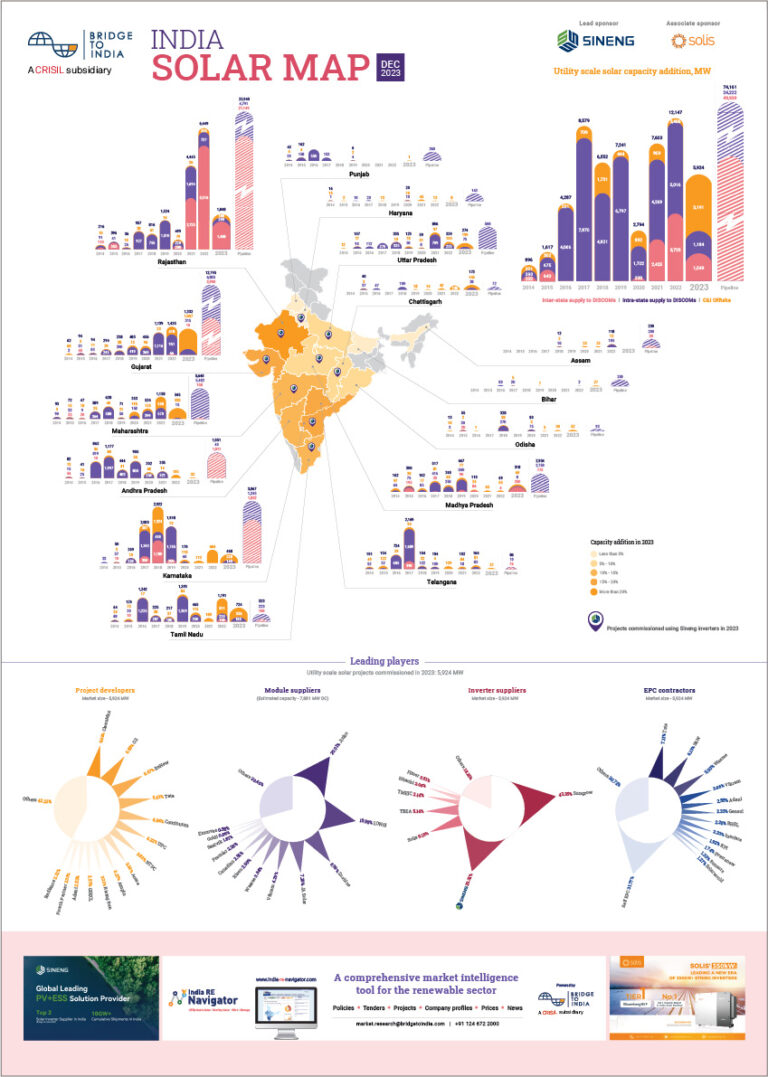Here are two facts about renewables in India: They make fundamental sense without any kind of government support and they are already being deployed across the country in numerous innovative ways. India is a fantastic laboratory. Of this year’s ten Ashden Awards (link) finalists, five are from India. The winner will be announced on May 22nd. Here is a brief introduction to them:
- Models range from village electrification to corporate sustainability
- Solar PV is the technology of choice
- The real innovation is in the business or cooperation model

Green Houses fed by solar water pumps
1. Rajasthan Horticulture Development Society (website)
In the desert state of Rajasthan, farmers’ sons are returning from cities to work on their farms thanks to a new solar-powered agricultural boom. Acute power and water shortages meant that farmers were only able to grow crops during the monsoon. But Rajasthan has a free and infinitely available resource: the sun. The Rajasthan Horticulture Development Society has provided more than 10,000 farmers with new solar-powered water pumps. Combined with drip irrigation and other technologies to cut water use, this enables year-round cultivation of high-value crops and a high-tech horticulture the state has never seen before. Farmers’ incomes as a result have more than doubled.
2. Mera Gao Power (website)
Uttar Pradesh-based Mera Gao Power is demonstrating the business case for meeting the needs of the some of the poorest people in India with the pioneering use of unsubsidised commercial micro grids. Vast stretches of rural India lie beyond the reach of the over-stretched national electricity grid, with most families so poor that even the cheapest solar lanterns are difficult to afford. But Mera Gao Power has found a middle way: creating solar-powered ‘micro grids’ are lighting up the state, one village at a time. Each system is easy to install and provides seven hours of light and mobile phone-charging for up to 32 houses. For the 20,000 families benefiting so far, that means more time to study, work and socialize in the evening. And with weekly payments of just 25 Rupees, the electricity is even cheaper than kerosene.
3. Infosys (website)
The Indian IT company Infosys switching to more sustainable growth, decreasing electricity consumption per staff member by 44% across its Indian business campuses. This is the result of seizing every opportunity to reduce energy consumption in its existing buildings – from reducing the size of chiller plants for air conditioning, to painting roofs white so they reflect the heat. Cutting-edge design of new buildings also helps keep offices cooler and maximise natural light. With a $80 million cut off its energy bills, Infosys has made a strong business case for large companies to invest into energy efficiency.
4. Greenway Grameen (website)
Greenway Grameen’s mission is to provide an affordable, desirable cookstove to improve the quality of life for Indian women. Collecting and cooking with wood and dung is not only time-consuming; it creates dirty, smoky kitchens. Greenway Grameen’s simple stoves dramatically reduce kitchen smoke, cook more quickly, and stay cleaner for longer. And they’ve been designed with women’s needs and aspirations in mind. Aside from taking care to produce a stove women were comfortable using, extensive market testing revealed that they sell far better when marketed as an essential part of a modern kitchen: more than 120,000 stoves have been sold so far.
5. Sakhi Unique Rural Enterprise (SURE) (website)
A powerful network of women entrepreneurs in central Maharashtra, India, is selling clean energy products like solar lanterns and cleaner cookstoves to other women, improving quality of life of both sellers and buyers. Since 2009, the non-profit social enterprise Sakhi Unique Rural Enterprise (SURE) has been selecting, training and supporting women micro entrepreneurs to be ‘energy entrepreneurs’. For the 600 ‘Sakhis’, selling clean energy products doesn’t just boost their income directly, it also carries a social cachet, helping boost their confidence. For the women using their new products, aside from reducing the drudgery of collecting fuel, cooking and cleaning pots, access to clean light for women and children opens up new possibilities for work and education.
Tobias Engelmeier is the Director at BRIDGE TO INDIA.












